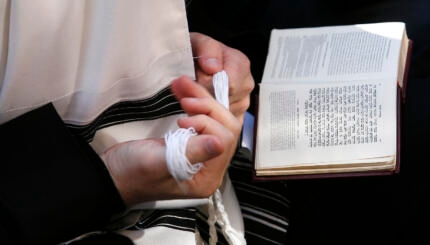As Rabbi Rachel Gurevitz says, statistics in the Pew Research Center’s survey of American Jewish attitudes and beliefs are wide open to interpretation. And different interpretations will lead to different responses.
94% of U.S. Jews say they are proud to be Jewish. Some interpreters will say that programs building Jewish identity have been successful; it is time to improve other facets of Jewish life. Others will insist we keep doing what works.
44% of married U.S. Jews have non-Jewish spouses. Some interpreters will suggest we try to reverse the trend, and focus on teaching a more exclusive sense of Jewish identity. Others will celebrate America’s multiculturalism and urge us to work in creative ways with diverse and unique families.
Really, the statistics are a kind of Rorshach test. Our responses to the statistics may tell us as much as the statistics themselves do.
Personally, I am fascinated by statistics about theism and religion. I came to these numbers with the belief that Jewish leaders need to develop more sophisticated approaches to spirituality. And I come away from them thinking that now is the time to act.
According to the Pew study, 72% of Jews say they believe in God.
What do the remaining 28% not believe in?
In a thoughtful, upbeat reflection on the study, Rabbi Joshua Hammerman writes:
Countless people tell me that they are “spiritual, but not religious.” Does that mean that they can’t relate to the old-man-in-the-sky image of God, especially after the Holocaust? No big surprise there. Most Jews can’t, myself included.
People tell me this, too; so many times it has become a platitude. Is this image really a deal-breaker in Jewish theism? I don’t think so. I do think that the phrase “I don’t believe in an old man in the sky” is a short, ready-to-hand, socially appropriate way to skirt a conversation about God, spirituality, or faith.
Unfortunately, we rabbis and teachers often accept these words at face value. We easily assume that many adult Jews have not moved beyond the first adolescent questions they asked about religion. So we tell them that mature Jews don’t believe in the “old man.” With kindness and warmth, we invite them to try adult Judaism as we know it.
Sometimes I think this is a self-protective move, because we are unprepared or afraid to step outside the Jewish discourse we know. Sometimes I think it is a patronizing approach, as well. Surely the life experience of these thoughtful adults has pushed them to existential reflection. Surely their challenges and yearnings have pointed them in many directions, not just towards questions about Divine authority.
Perhaps they do not feel held by a great heart of compassion, as Catholics might say.
Perhaps they do not believe that synchronicities in their life are glimpses into a prepared destiny, as depth psychologists might say.
Perhaps they have lost hope that humanity may be evolving towards greater justice and peace, as Quakers might say.
These are all components of faith, all aspects of what people imagine an effective God might provide, and all ideas that have (and have had) a place in Jewish discourse. If we see ourselves as spiritual teachers, it is our job to meet seekers where they are, not just to invite them to join us where we are. But to do so, we need a broader understanding of what faith means, and a web of threads connecting kinds of spirituality with concepts of God.
To gain this understanding, we may have to step temporarily out of our own comfort zone in Jewish religious vocabulary. Different religious and philosophical traditions emphasize different aspects of a soul’s life journey. Exploring those aspects may help us understand the hearts of the seekers who turn to us. Learning new concepts may broaden our ability to welcome diverse Jews into spiritual life.
We may find, in fact, that the question “Do you believe in God or not?” is an inadequate tool to gauge spirituality or even religious belief. Perhaps a broad spectrum of existential reaching, questioning and growing connects all 100% of Jews. And we, the so-called spiritual teachers, need to catch up with this reality.
We should not be afraid that this exploration will lead us –- or those we teach and counsel — away from Judaism. In fact, the Pew study suggests, now is a perfect moment to risk learning something new. For Jewish Americans, both multicultural comfort and Jewish pride are at an all-time high. Flexible spiritual guidance from open-minded, broadly-educated rabbis can only increase that pride.
Image: www.reflectingrunes.com. Cross-posted at www.OnSophiaStreet.com



